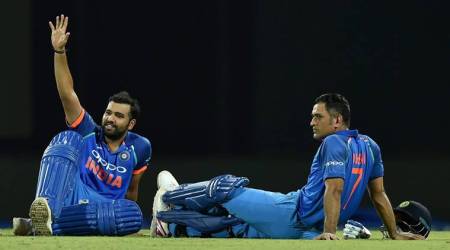 The seventh-seeded Japanese played out of her skin to beat Sindhu 21-19, 20-22, 22-20. In the semifinal, she had beaten Saina Nehwal. (Source: AP)
The seventh-seeded Japanese played out of her skin to beat Sindhu 21-19, 20-22, 22-20. In the semifinal, she had beaten Saina Nehwal. (Source: AP)
PV Sindhu knew Nozomi Okuhara was going to make her run. She was prepared if that could’ve fetched her the World Championship gold. No one will fault her for falling short – for India’s most successful shuttler, an exemplary competitor, ran harder than ever, picked some absurdly difficult returns at the net and made it difficult for Nozomi Okuhara to become the World Champion. But at the end of the 19-21, 22-20, 20-22 scoreline that went against her, Sindhu ended with a silver and there was nothing to be said beyond.
Okuhara was playing her third straight 3-setter – she ended the week scalping Carolina Marin, Saina Nehwal and PV Sindhu, all dragging her to a decider. Given she had answers for each of them, the World Champion can safely say she is playing the most complete badminton of her life.
On this day, despite Sindhu’s most valiant attempt to have the last laugh, the Japanese was dictating the direction of play till the end, from the start. In contrast to her strategy against Saina, – pulling her into a lunge at the forecourt, Okuhara laid the classical trap – pushing Sindhu diagonally, back and front. Okuhara remains a mystery without a defined weapon. What she does possess is a varied range of strokes that help her tire out an opponent by make them run ragged at every point of the match.
She’s an endurance machine, but for all the business of body contortion, Okuhara has the ability to remain impossibly still on the court and compose herself for the big points. At the start of the match, she faced a black curtain wall and psyched herself up. On the court, she bowed with respect at the start of every game. “It’s like respect for the court and for the other player. In Japan, we believe badminton and the game’s not just about myself,” she would explain. When the match neared the end, such had been the ebb and flow of perspiration and emotion that the Japanese would tell herself she should just enjoy, because anyone could’ve won. “Fortunately I could enjoy and play my strokes,” she’d add.
Slow start
Okuhara had started the match at a slow pace – Sindhu content to scrape off a few points as the scores went 7-5. It was around this time that like a button switched on, the Japanese suddenly increased the pace of the rally and started unleashing her whippy drops and moving Sindhu about. There were clear surges in the attack from 13-8 when Okuhara could vary the pace mid-rally but always end with a quick kill – at times smashes to Sindhu’s ribs.
Sindhu’s first lapse came in her being conned by Okuhara’s flat length. Coach Mulyo Handoyo tried telling the Indian to hit higher and use her height, but Okuhara ensured the taller girl (179 cms as against the Japanese girl’s 155) simply didn’t get the leeway to free her arms. Sindhu’s first outright smash winner came in the third game. Dragged into playing flatter, Sindhu erred on the net and in her serve, even as Okuhara’s backhand cross-courts at the net – a retrieving tool, assumed the power of winners.
Sindhu continued to float her drops and tosses – without a punch on the stroke, even while her opponent stayed sharp and cutting on her strokes.
At 19-20 in the opener, came the first of the many long rallies. Desperate retrievals from both ended with Sindhu hitting a lift out on the side. Okuhara becomes double the threat with a game in her pocket. Sindhu’s task was cut out.
The Indian would step up the aggression, but such was Okuhara’s smooth control over proceedings that she could toy with any pace or position and Sindhu started spraying her cross-courts out.
Riding the wild swing
It was in the latter part of the second set that Sindhu rode the wild swing. She had three stupendous net winners – taps on the run, with some net cord luck which came from her dazzling anticipation. On one such occasion, the Japanese coaches were up and raging alleging a double shot, but Sindhu was ferociously brave on the forecourt, and it was building up towards the definitive rally at 21-20.
The audience had got used to the impossible shuttle-chase downs and were on about their slogans, when the 22-21 point happened. It went on forever – tosses and net-dribbles and four corners of the court and arms flying to heaving acknowledgements of the two women, even as in the 67th minute, the women had left Lin Dan and Viktor Axelsen properly waiting backstage for their run.
The rally itself could be divided into two halves – the first where the athletic abilities shone in full glory, and the latter where tiredness was personified in shots pulled from thin air even as gritty spirit brought the crowd to a standing ovation. It ended with Okuhara hitting into the net, pulling the match into the decider. The long rally perhaps tired out Sindhu – a battle won. As she stared at the war.
In the third game, it became routine to watch the gladiators play out those long rallies and scurry at a demanding pace, with amazement over just how they were keeping the shuttle in for so long. In truth, Okuhara was stringing Sindhu back and forth and ensuring the Indian would have very little left to launch a counterattack.
The two were locked 3-3 head to head before this match and at the stroke of the 100th minute, the score read 17-17 in the decider. Somehow, Okuhara looked in better control of what was to unfold, clearly better equipped with stroking options.
Sindhu would receive a warning for time-wasting, and it’s when Okuhara turned into a monk on court – standing still in between points and a coil unwinding as soon as the point took off. Sindhu’s errors would mount as she would return limply, and while her net returns were prescient of a drooping challenge, it was the sliced drop that had felled Saina that was now sent swirling on Sindhu for an epic win that’ll be remembered by all.
“There are lessons to be learnt from this. We played an opponent with better energy and we needed to be smarter. Gritty wasn’t good enough today,” coach Gopichand would say.
He admitted that even if it sounded ridiculous to call an Olympic and World Championship silver medallist a “work in progress”, there was indeed work to be done. “Maybe she needed more weapons. She wasn’t sharp enough. She could’ve attacked at the net, but she’d have to run a lot – come back for the lift. Sindhu got predictable. But the way I look at it, this could’ve been the Olympic semis. So she’s won the big ones. The gold will come,” he added.
For the audience, though, it was the greatest match they’ve seen in this part of the world since the 1997 World Championships final won by Peter Rasmussen. For a stadium full of youngsters, this one was better than that. One for the the generation.
BAI announces bounty
Badminton Association of India and President Himanta Biswa Sarma announced a cash prize of Rs 10 Lakh to PV Sindhu and Rs 5 Lakh to Saina Nehwal for her bronze medal winning feat.
Rally for the ages: 73 shots, 82 seconds
Sindhu had three game points to level the final. Okuhara made it 20-20. The Indian won the next point, and what followed was hardly believable:
One player was lying on her back, the other was doubled up in pain. In a match full of lung-busting corner-to-corner rallies, the one to decide the second game takes the cake. It lasted all of 73 shots and a minute and 22 seconds. Both players started with probing for an opening. The full dimensions of the court were utilised. Okuhara would make Sindhu lunge low down at the net, and after a shoestring retrieval, would force her to lunge backwards deep.
Sindhu would force Okuhara to arch her back and use every millimetre of her 5’1” frame to return the high tosses.
It was a riveting exchange. But as it just refused to end, it was transformed into one of the best sporting contest one could ever wish to see. All the shots in the book were tested. Smashes, half-smashes, drops, net shots, clears, tosses, and the athleticism that defied the laws of physics.
It became a battle of wills. Then Okuhara hit a tired smash to Sindhu’s backhand corner. It would have been tough to retrieve it at the start of the match, let alone now. But the Indian somehow redirected the shuttle for a cross-court shot just over the net, which Okuhara could not send beyond the net, falling in a crumpled heap in the process.

